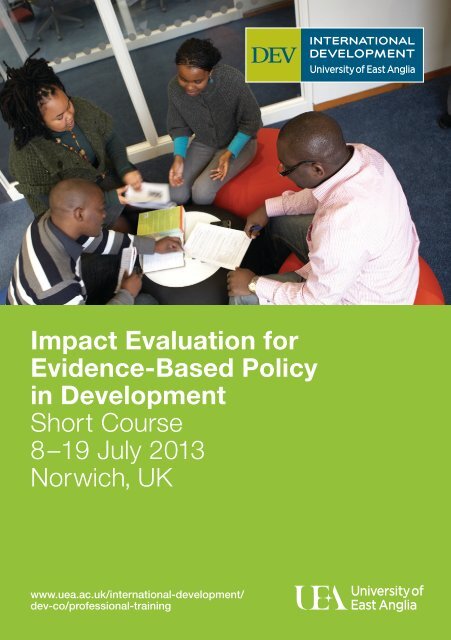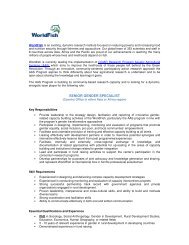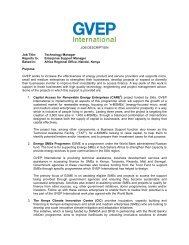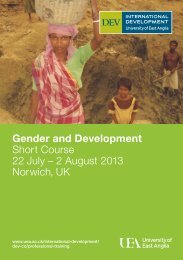download a pdf of the course brochure - University of East Anglia
download a pdf of the course brochure - University of East Anglia
download a pdf of the course brochure - University of East Anglia
You also want an ePaper? Increase the reach of your titles
YUMPU automatically turns print PDFs into web optimized ePapers that Google loves.
Impact Evaluation for<br />
Evidence-Based Policy<br />
in Development<br />
Short Course<br />
8–19 July 2013<br />
Norwich, UK<br />
www.uea.ac.uk/international-development/<br />
dev-co/pr<strong>of</strong>essional-training
Impact Evaluation for Evidence-Based Policy in Development<br />
“I loved <strong>the</strong> training, it was perfect for me since<br />
it built skills I needed.”<br />
2012 Short Course participant<br />
Dates 8-19 July 2013<br />
Places 20<br />
Fee £3,000<br />
Language<br />
Entry requirements<br />
Target audience<br />
Location<br />
The <strong>course</strong> is conducted in English. Full competence in English,<br />
written and spoken is an essential requirement.<br />
A working knowledge <strong>of</strong> basic statistics is strongly desirable. We will provide<br />
a self-assessment test to judge <strong>the</strong> level <strong>of</strong> statistical skills and brief revision<br />
<strong>of</strong> statistics up to multiple linear regression. An introduction to <strong>the</strong> statistical<br />
package Stata will be provided in addition to <strong>the</strong> specific impact evaluation<br />
techniques. It is assumed that participants will be familiar with <strong>the</strong> Windows<br />
operating system.<br />
The target audience for this <strong>course</strong> is early and mid-level pr<strong>of</strong>essionals,<br />
postgraduate students and academics with interests in or working with<br />
international agencies, governments in developing and developed countries,<br />
think-tanks, NGOs and o<strong>the</strong>r donor organisations which need to understand<br />
<strong>the</strong> methods used in evidence-based policy making in order to evaluate and<br />
justify continued public spending on particular projects and programmes.<br />
International Development UEA, <strong>University</strong> <strong>of</strong> <strong>East</strong> <strong>Anglia</strong>, Norwich, UK<br />
Teaching team<br />
This <strong>course</strong> has been developed by Richard<br />
Palmer-Jones and Maren Duvendack<br />
who are both development economists<br />
with extensive evaluation experience<br />
in sub-Saharan Africa and South Asia,<br />
especially micr<strong>of</strong>inance, irrigation, agriculture<br />
and poverty reduction. Additional tutors will<br />
be drawn from <strong>the</strong> School <strong>of</strong> International<br />
Development UEA, <strong>the</strong> Overseas<br />
Development Institute, 3ie and o<strong>the</strong>r<br />
(non-quantitative) social scientists involved<br />
in IE at UEA and representatives <strong>of</strong> agencies<br />
commissioning modern IE and evidence<br />
based policy.<br />
Recent contributors include:<br />
Ben D’Exelle, Bereket Kebede, Sunil Kumar,<br />
Elliot Stern, John Young, Nick Scott,<br />
Julian Barr and Hugh Waddington.<br />
Institutional Capability<br />
The School <strong>of</strong> International Development is<br />
particularly well constituted to provide a broad<br />
based multi-disciplinary environment in which<br />
to teach evidence based policy. There is a wide<br />
range <strong>of</strong> academic disciplines among faculty<br />
members who have intensive engagement in<br />
development practice through academic and<br />
funded research and consultancy in many<br />
development arenas and geographical regions.
Course content and structure<br />
“I really appreciated <strong>the</strong> availability <strong>of</strong> <strong>the</strong> staff beyond <strong>the</strong> <strong>course</strong><br />
schedule to answer questions or provide additional material.”<br />
2012 Short Course participant<br />
Objectives<br />
Given <strong>the</strong> need for policy makers, programme<br />
implementing and funding organisations to<br />
justify <strong>the</strong>ir choice <strong>of</strong> social and economic<br />
interventions, it has become increasingly<br />
important to use ‘evidence-based’ criteria<br />
to decide what kind <strong>of</strong> programmes work,<br />
how, for whom, in what circumstances and<br />
at what cost. Much evidence is quantitative<br />
in nature and this <strong>course</strong> aims to equip those<br />
working in governments, funding agencies,<br />
research and non-government organisations<br />
to understand, critique and make effective<br />
use <strong>of</strong> such evidence.<br />
While <strong>the</strong> <strong>course</strong> focuses on issues <strong>of</strong><br />
attribution – tracing out cause and effect<br />
– and quantification, it is also concerned<br />
with <strong>the</strong> context, criteria and limitations <strong>of</strong><br />
evidence-based quantitative evaluations.<br />
Staff involved in designing and implementing<br />
development programmes <strong>of</strong>ten find it<br />
useful to integrate impact evaluation (IE)<br />
mechanisms in <strong>the</strong>ir programmes in order<br />
to learn from, measure effectiveness <strong>of</strong> and<br />
where possible, judge <strong>the</strong> replicability <strong>of</strong><br />
interventions.<br />
The <strong>course</strong> <strong>the</strong>refore aims to address an<br />
important prerequisite for incorporating IE into<br />
programme design: a <strong>the</strong>oretical and practical<br />
understanding <strong>of</strong> IE approaches to enable<br />
selection <strong>of</strong> appropriate methodologies,<br />
coupled with careful appraisal <strong>of</strong> <strong>the</strong> resulting<br />
evidence. Thus, participants will be introduced<br />
to current quantitative as well as qualitative<br />
evaluation techniques for impact evaluation<br />
and gain critical understanding <strong>of</strong> <strong>the</strong> roles<br />
<strong>the</strong>y can play in <strong>the</strong> design and assessment <strong>of</strong><br />
public policy and development interventions.<br />
Course structure<br />
Teaching will consist <strong>of</strong> interactive<br />
lectures, group discussions and several<br />
worked-through examples where participants<br />
will analyse data from established IE<br />
examples that are drawn from development<br />
literature and elsewhere.<br />
Main areas <strong>of</strong> <strong>course</strong> content<br />
Theories and practices <strong>of</strong> evaluation in<br />
public policy<br />
The evaluation problem<br />
– Attribution, selection and placement<br />
biases<br />
Evaluation research designs<br />
– Observational data, quasi-experiments<br />
and correlation studies<br />
– Social experiments, natural experiments<br />
and randomised control trials<br />
– Qualitative evaluation designs<br />
– Evaluation survey design<br />
Econometric techniques for impact<br />
evaluation<br />
– Revision <strong>of</strong> basic econometrics<br />
– Instrumental variables technique<br />
– Propensity score matching<br />
– Regression discontinuity<br />
– Difference-in-difference estimation<br />
Systematic review and meta-analysis<br />
in development<br />
Replication and research ethics<br />
Communication and dissemination<br />
<strong>of</strong> evaluation evidence
How to Apply<br />
For an application form email devco.train@uea.ac.uk or apply online through <strong>the</strong> website at<br />
www.uea.ac.uk/international-development/dev-co/pr<strong>of</strong>essional-training<br />
International Development UEA<br />
International Development UEA is a charitable<br />
company that has pioneered research, training<br />
and consultancy in International Development<br />
since 1967. International Development UEA<br />
manages both <strong>the</strong> UK-based and international<br />
project activities <strong>of</strong> <strong>the</strong> <strong>University</strong> <strong>of</strong> <strong>East</strong><br />
<strong>Anglia</strong>’s School <strong>of</strong> International Development,<br />
as well as work undertaken in partnership<br />
with o<strong>the</strong>r Schools. The company works<br />
with a wide range <strong>of</strong> clients, including<br />
national and international development<br />
agencies, governments, NGOs,<br />
international research centres and private<br />
clients. Since 2001, we have worked<br />
with an estimated 600 different partner<br />
organisations and in any year we have<br />
100 or more live projects underway.<br />
“The teaching team was excellent and <strong>the</strong> administration<br />
extremely helpful.” 2012 Short Course participant<br />
We also provide customised training for individuals and groups. Please contact us if<br />
you require training in an area which is not covered in one <strong>of</strong> our scheduled <strong>course</strong>s.<br />
Fur<strong>the</strong>r Information<br />
Skills Development and Training Office<br />
International Development UEA<br />
<strong>University</strong> <strong>of</strong> <strong>East</strong> <strong>Anglia</strong><br />
Norwich Research Park<br />
Norwich NR4 7TJ<br />
T +44 (0)1603 592340<br />
F +44 (0)1603 591170<br />
E devco.train@uea.ac.uk<br />
W www.uea.ac.uk/international-development/<br />
dev-co/pr<strong>of</strong>essional-training





